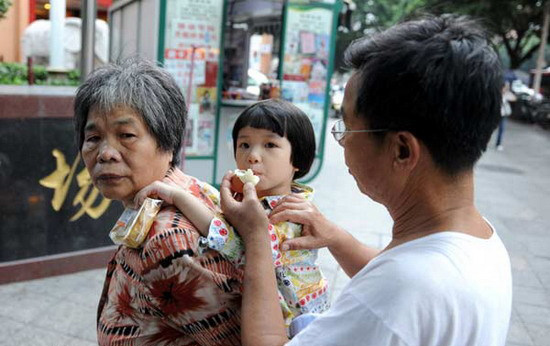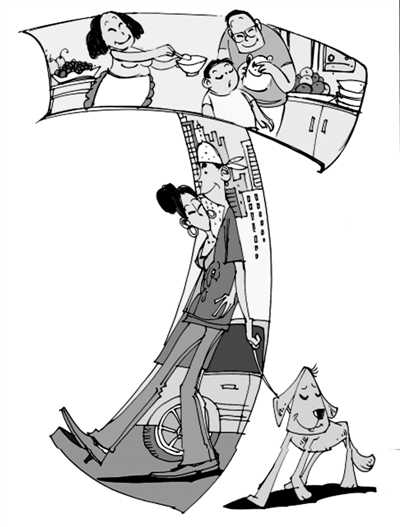Sub-DINKs find fleeting comfort zone in aging parents

Grandparents feed their granddaughter an egg. In China, many grandparents are willing to lend a helping hand raising their grandchildren, considering it as a way to realize self-value in later life and help lessen the burden of their adult children. (PHOTO: WWW.DFIC.CN)

By transferring much of their childcare responsibilities to elderly parents, sub-DINKs are able to live a comfortable life, but it is only temporary.
Following the popularity of DINK (double income, no kids) lifestyles, a new term, sub-DINK, has been coined in China to refer to couples who unwillingly have children due to family pressure or traditional expectations. These couples often transfer much of the responsibility of raising their children to their elderly parents to hold on to their DINK lifestyles. Many grandparents in China are willing to lend a hand raising their grandchildren, especially in one-child families, which makes the sub-DINK lifestyle even more appealing to young couples.
The rise of sub-DINK couples can be partly attributed to China’s family planning policy, with many children born in the first decade of the policy now married and having children. But future problems loom on the horizon for couples after their aging parents become unable to care for their children.
Research methodology
This study gathered data through in-depth interviews and qualitative analysis. Based on the “purposive sampling” principles, researchers interviewed 19 sub-DINK spouses from one-child families.
Researchers judged whether interviewees could be identified as sub-DINK based on three criteria: their pre-birth desire to have a child; their assertiveness or passivity toward having a child, and whether they currently live with their child.
However, it can be difficult to measure a person’s complicity in having a child. Some parents change their views about children after birth, while it is hard to dichotomize subjective will. Interviewees unsure about whether they willingly had children were therefore excluded from the study.
Cultural factors
Not having children is a core part of the DINK lifestyle. Although sub-DINKs are parents, they consider children unwilling additions to their lifestyles.
In China’s cultural context, unwillingness to have children is regarded as shameful and shirking social responsibilities. Only through being a parent can an individual settle as a mature, responsible member of society.
Influenced by traditional culture, public opinion, the media, group pressure and forceful persuasion from parents and relatives, some only-child couples, despite still adjusting to marriage life, commit to having children after a struggle between self-will and external pressure.
Many Chinese with traditional ideas consider “raising grandchildren” as a way to realize self-value in later life and help lessen the burden of their adult children.
Some scholars even said only-child couples deem their parents as more reliable than their life partners. The intimate relationship hardly changes even after the child gets married. Parents therefore play a key role in sub-DINKs’ childraising process.
In her book Culture and Commitment (1970), American cultural anthropologist Margaret Mead put forward “three different kinds of culture”: postfigurative, in which children learn primarily from their forebears; cofigurative, in which both children and adults learn from their peers, and prefigurative, in which adults learn from their children.
The three kinds of culture described by Mead reflect the three kinds of intergenerational relations: control, alienation and dialogue.
Determining how to best garner childcare support from grandparents and engage in smooth communication and dialogue with them is therefore an important issue for would-be sub-DINKs.
Spousal relationship first
To sub-DINKs from only-child families, the “extended” childcare system is of great significance in their married life. It is related to the upbringing of the next generation, the relationship between themselves and their parents, as well as the state and quality of marriage life.
Disagreements about raising children pose difficulties to the intergenerational relationship between sub-DINKs and their parents.
On the one hand, sub-DINKS are dissatisfied with their parents’ outdated parenting style. On the other hand, they are dependent on their parents for raising their children.
Overseas studies have suggested that one of the trends in marriage that is changing with modernization is the dominance of spousal relationship over the parent-child relationship.
To only-child sub-DINK couples, marriage is more an affectionate bond than a necessary step before having children. They no longer pin their hopes on the next generation and count on their children to maintain their love and a solid family. Even if they have children, sub-DINKs’ relationships still play a central role since their children are not around.
Chinese sociologist Xu Minghong pinpointed a trend of cohesion in Chinese families as evident among only-child sub-DINKs. While they think they have responded to the traditional view that not having children will affect marriage, the core of their marriage has been placed on how to handle the husband-wife relationship and derive satisfaction from it.
In daily life, children and elders are secondary considerations within the sub-DINK relationship.
Problems ahead
It is undeniable that there are preconditions for sub-DINKs, such as the sustainability of the extended childraising system. In the long term, the ideal and balanced status will be broken.
The extended system will collapse as their parents age or pass away. When growing up, the children of sub-DINK couples will also face issues linked to their education, relationship with parents, cultivation of personality and psychological development.
Late eminent Chinese sociologist Fei Xiaotong pointed out the difference between Chinese and Western societies, noting that the intergenerational relationship in Chinese families is based on “fostering the young and supporting the old,” which forms the basis for the deeply rooted view of “raising children for support in old age.”
Sub-DINKs, despite enjoying the full support of their parents in childcare, nevertheless face an inevitable difficult transition in the future. Not only will they have to learn how to bring up and educate their children when the extended childraising system breaks down, but they will also lack awareness of supporting their elderly parents due to their long-term reliance on them.
In other words, sub-DINKs will have a series of difficulties to overcome in the future, including educating their kids, supporting their parents and maintaining the spousal relationship.
In China, a family was basically an “economic community” and “childbearing cooperative” in the past. Today, the advancements of modernization have brought about noticeable changes in individual life and marital choice.
In marriage, sub-DINKs have upgraded their relationship to a core status, as both parties attach more importance to the quality of marriage life in their two-person world. They don’t regard kids as a necessary condition for maintaining their relationship and family stability, yet in the future, they will face a variety of problems in children’s education.
The sub-DINK status is not so much an exploration of marriage form amid modernization as a choice of individuals in the broad network encompassing family, society and culture, and a reconciliation between the family planning policy and traditional childraising culture.
The sub-DINK phenomenon among only-child spouses reflects a marital choice in the period of social transformation that is not only individualized and subjective, but also socialized with deep imprints of history and culture.
Individuals are not only active entities but also a passive end that is closely tied to traditional culture and national conditions. Further research is needed to explore what is the future of sub-DINKs and what kind of education, support and marital problems will arise when children are absent from their marriage.
Wang Xin is from the School of Philosophy and Social Development at Shandong University.
